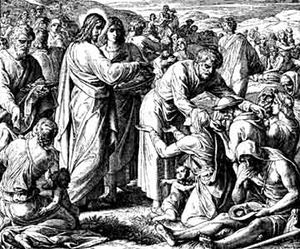Template:Clergy: Difference between revisions
Jump to navigation
Jump to search
No edit summary |
No edit summary |
||
| (17 intermediate revisions by 2 users not shown) | |||
| Line 1: | Line 1: | ||
[[File:Jesusfeeds.jpg|right|300px|thumb|[[Abraham]], [[Moses]], John the | [[File:Jesusfeeds.jpg|right|300px|thumb|[[Abraham]], [[Moses]], [[John the Baptist]] and [[Jesus]] were all appointed tasks and positions.<Br>When Jesus [[appoint]]ed a kingdom to His [[little flock]] He was delegating a responsibility upon them. When He required them to "sell all they had" and follow Him, there was no such command to the general population.<Br>While the ministers sold their property and owned [[all things common]], the purpose of the [[Messiah]] was to set the [[captive]] free while returning everyman to his [[family]] and to his [[possessions]]. <Br>Those [[called out]] ministers could be called a form of ''[[clergy]]'', but their duties, responsibilities, and limiting criteria were defined by Christ and may not resemble modern forms of [[clergy]]. The engine that drives the [[kingdom of God]], which is [[faith]], is found in the [[heart and mind]] of the individual and it is fueled by the [[Holy Spirit]].<Br>Terms like [[clergy]], [[laity]], [[elder]], [[father]], wife, son, or daughter have their place when properly defined, but neither God nor the [[Holy Spirit]] are a [[respecter of persons]].<Br>Like the "[[Church in the wilderness]]"—which consisted of those ministers of a "[[Peculiar people]]" who were "[[called out]]" of the ''camp of the [[golden calf]]'' by [[Moses]]—those who were "[[called out]]" by [[Jesus]] played a pivotal role in serving the people of the [[early Christian]] community through the free practice of "[[Pure religion]]".<Br>Certainly the [[early Church]] advocated a [[Daily ministration]] for the needy of the Christian community that was dependent on [[Charity]] only. It was not like the system of [[Corban]] of the [[Pharisees]] nor the [[Bread and circuses|free bread]] of [[Rome]] which compelled the offerings of the people. It was the practice of [[Pure Religion]] by the early church that brought them into [[Christian conflict|conflict]] with [[Public religion]] and the [[Covetous Practices]] of the [[World]]. To understand the [[#clergy of Christ|clergy of Christ]] it may be important to distinguish it from the [[clergyism]] of the [[Modern Church]] and the [[Clergyism#clergy of the world|clergy of the world]]. <Br>'''[[Clergy]] Audio 1'''<Br>[https://www.hisholychurch.org/audio/20240604clergy.mp3 Download Recording Clergy 1] <Br>or press play<Br> <html><audio controls src="https://www.hisholychurch.org/audio/20240604clergy.mp3"></audio></html><Br>'''[[Clergy]] Audio 2'''<Br>[https://www.hisholychurch.org/audio/20240604clergy2.mp3 Download Recording Clergy 2] <Br>or press play<Br> <html><audio controls src="https://www.hisholychurch.org/audio/20240604clergy2.mp3"></audio></html><Br><Br>]] | ||
Latest revision as of 10:18, 17 April 2024

When Jesus appointed a kingdom to His little flock He was delegating a responsibility upon them. When He required them to "sell all they had" and follow Him, there was no such command to the general population.
While the ministers sold their property and owned all things common, the purpose of the Messiah was to set the captive free while returning everyman to his family and to his possessions.
Those called out ministers could be called a form of clergy, but their duties, responsibilities, and limiting criteria were defined by Christ and may not resemble modern forms of clergy. The engine that drives the kingdom of God, which is faith, is found in the heart and mind of the individual and it is fueled by the Holy Spirit.
Terms like clergy, laity, elder, father, wife, son, or daughter have their place when properly defined, but neither God nor the Holy Spirit are a respecter of persons.
Like the "Church in the wilderness"—which consisted of those ministers of a "Peculiar people" who were "called out" of the camp of the golden calf by Moses—those who were "called out" by Jesus played a pivotal role in serving the people of the early Christian community through the free practice of "Pure religion".
Certainly the early Church advocated a Daily ministration for the needy of the Christian community that was dependent on Charity only. It was not like the system of Corban of the Pharisees nor the free bread of Rome which compelled the offerings of the people. It was the practice of Pure Religion by the early church that brought them into conflict with Public religion and the Covetous Practices of the World. To understand the clergy of Christ it may be important to distinguish it from the clergyism of the Modern Church and the clergy of the world.
Clergy Audio 1
Download Recording Clergy 1
or press play
Clergy Audio 2
Download Recording Clergy 2
or press play